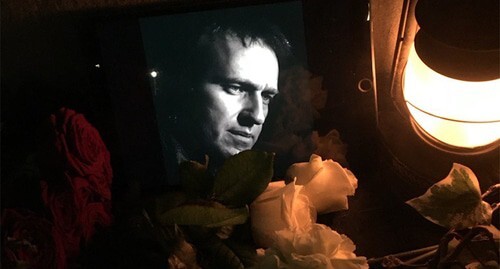
19 February 2024, 19:13
Sochi residents continue bringing flowers to Navalny's* memorial
Local residents and activists continue bringing flowers to the memorial to Alexei Navalny* in Sochi, which was spontaneously formed near the monument to victims of political repressions. Law enforcers are questioning those who bring flowers and check their documents.
The "Caucasian Knot" has reported that on February 16, Alexei Navalny* died in a colony. In Tbilisi, Batumi and Yerevan, activists paid tribute to his memory. In Krasnodar, activists laid flowers at the memorial to fascism victims; Andrei Vyazov, a city resident, was arrested for 14 days for displaying a banner from Navalny's* presidential campaign.
The Sochi police continue to be on duty at the martyrology in the mini-park and at the Memory Boulder for Victims of Political Repressions. People who approach the monument with flowers, candles and Navalny's* photos are detained by policemen and charged with extremism, participation in unsanctioned rallies, and are also blacklisted. Local bloggers, members of social movements and the "Yabloko" Party have reported about these facts.
"Today (on February 17), the three of us approached the martyrology in Constitution Street with the aim of laying flowers in Navalny's* memory," said Nikolai, an activist of the "Yabloko" Party.
As soon as the above three activists approached the martyrology with flowers, they were immediately detained. "Policemen have aggressively attacked all the three," Nikolai has noted.
Valentina, an activist, said that she had put flowers, but policemen took them away. She has noted that she tried to explain that the attitude to any person's death is a sacred ritual and that removing flowers from the memorial is immoral. "They were all very aggressive. There was a policewoman among them," Valentina has stated.
The Sochi bloggers and supporters of Navalny*, Alexei and Maria, were also detained on February 17; they tried to charge them with extremism for a bouquet with a ribbon with the word "we mourn". "They tried to shame us, threatened with a protocol and taking us to the police station, if we did not present our passports; however, they refused to explain why they demanded our passports," Maria said, adding that the bloggers had to show their passports because of the threat of arrest for disobeying the police.
*Navalny's offices are recognized as extremist organizations and banned in Russia. Alexei Navalny is a founder of the Anti-Corruption Foundation (known as FBK), an NCO that is included by the Russian Ministry of Justice (MoJ) into the register of NCOs performing functions of a foreign agent. The NCO is also recognized by a court as extremist and banned in the territory of Russia.
This article was originally published on the Russian page of 24/7 Internet agency ‘Caucasian Knot’ on February 17, 2024 at 06:17 pm MSK. To access the full text of the article, click here.
Author: Kristina Romanova Source: СK correspondent





Комментирование через Кавказский узел